

|
Back to |
| The Front Page |
| Letters & Opinion |
|
How and why we voted against televised Golf Croquet
by Richard Hilditch |
|
||||||||
I joined the English Croquet Association in early 1980 and since I was still at University until September 1983 I was not politically active, although I presided over the largest body of croquet players in the country at Cambridge. I will give you excerpts from various croquet Gazettes after that date, at a time the Gazette was a reasonably controlled document (The subtitle was "the official organ of the Croquet Association) and we had just gone through an embarrassing time when it was under the control of a reactionary, Bryan Lloyd Pratt.
Richard Hilditch has been a fixture of English croquet since his university days, as a popular tournament director and manager as well as a shrewd observer of the croquet scene worldwide. Early in his croquet career, he was witness to what may now be regarded as a watershed event in English croquet: the narrow defeat of a concerted move to make Golf Croquet the public face of the sport - most particularly in a once-in-a-generation national television opportunity. There are many sides to this issue, and Hilditch himself, in the account below, acknoweldged that he has himself been on more than one side. It's easy to judge what "should" have happened in hindsight, and the judgment on those who led the sport down a blind alley should not be harsh; that was then, and this is now. But surely all organizers can learn from the history of the English Croquet Association's actions in the matter. In response to my request for this personal retrospective, Hilditch wrote, "I'll be happy to give you some details, but I don't know how much a 20-year-old scandal is worth...."
Winter 1980, extract from a Council meeting of 18th October 1980: "Filming took place near Evesham in July for a proposed BBC2 TV programme of croquet, which it is hoped will be screened in the New Year". At this time we had just three TV channels in the UK; BBC1 and ITV were the majority interest and BBC2 (about 12 years old) catered to speciality (especially high brow) audiences (as it still does to an extent).
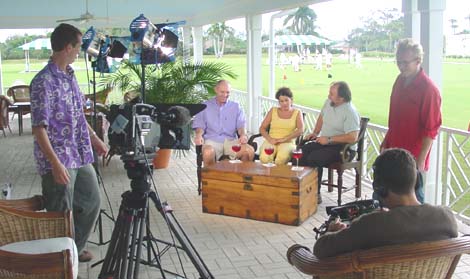
|
| In all mainstream media, croquet is more widely reported as a lifestyle than as a sport. The croquet lawns at the National Croquet Center in West Palm Beach were merely a backdrop to a British television program about winter getaways for Brits on holiday. |
April 1981, cover article, Chairman's Report 1980/81 (Robin Godby): "During the past year the BBC at their suggestion made a pilot film of croquet for television with a view to showing a series of matches if it was successful. I and some other members of Council have seen this and consider it certainly to be successful but whether it is acceptable to the powers that be is as yet unknown. Should any such series be shown on television it would undoubtedly create an enormous interest in our sport and possibly an overwhelming demand by potential players. How the problem of shortage of courts would be met I do not know but publicity of this sort should be of general benefit to the game. We must, however, be ever vigilant that the amateur status of the game is not affected."
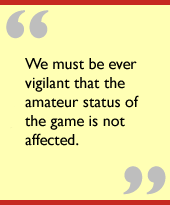
The BBC never screened this pilot and certainly did not proceed with a series.
December 1981, extract from Council minutes, 21st November 1981: "It was the general consensus...that the Committee should not stress Golf Croquet when trying to get television coverage."
Winter 1982, Lionel Wharrad (vice chairman of Council, chairman of publicity and development committee) to club conference, 23 October 1982, a crystal ball speech forecasting the future: "Tournament players - and especially perhaps the young top players - all want to see more publicity for croquet. It is probably true that most tournament players would like to see croquet televised as a sport; we know that televising is difficult. The TV experts in both the BBC and IBA companies say: (1. The game is too long and (2 The court is too big for successful television to be possible.
Demand by the more active players for more publicity for the game will lead to attempts to modify the game so that it can be televised and enjoyed by greatly expanded numbers. Thus there will inevitably be an acceptance of the fact that a shorter game on a smaller lawn is required."
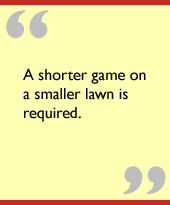
Later in the speech Lionel outlined some of the ideas he was later to turn into "short croquet" (used in the 1986 TV event), although there was absolutely no player demand that led to this and very little support for this variation in the 16 years since (I speak as the winner of the second short ever short croquet event at Buxton). To be fair, he majored on the idea of converting tennis courts in public parks to croquet lawns (a viable option at the time), but included the following on TV as a factor: ".... meaning that a new small lawn game would be introduced officially by the CA and included in the book of laws"; and "...the desire for more publicity for the game and the inevitable attraction of television".
I have never understood the size issue for TV, if golf can be handled. The fundamental problems are difficulty AND inability for the viewer to empathise with the player. If the viewer cannot cannot tell if a stroke is good or bad, there will be little interest in the game or emphathy with the player.
Winter 1983, extract from proceedings of Council, 29 October 1983: "The Sponsorship Committee was authorised to proceed with negotiations for a televised sponsored Golf Croquet tournament."
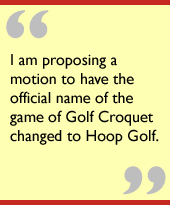
Letter to the editor from Roger Wheeler (a member of Council and well known manager) on the subject of Hoop Golf: "When members read the agenda for the AGM on 7 April 1984, they will discover that I am proposing a motion to have the official name of the game of Golf Croquet changed to Hoop Golf.
This may seem to be a rather trivial proposal: it is, however, not unlike those opposition motions in parliament that propose a reduction of a penny in a minister's salary and merely serve as a pretext for initiating a widely ranging debate on government policy that has little to do with the ostensible substance of the motion.
"I am desperately worried that the Croquet Association, having now tasted the delights of sponsorship income on a modest scale [we had had sponsorship to the tune of a few thousand pounds for a few years for the home internationals, indeed that was why they were started] and found them rather palatable, is about to rush headlong into ill-considered endeavours to attract more such revenue, whatever the cost. (From the apple to the mess of potage in one quick slurp?)
"Clearly, without television coverage of the sport, no sponsor is going to make more than a passing nod in our direction and the defeatist attitude is gaining ground that the difficulties of presenting Association Croquet on television are likely to prove insuperable.
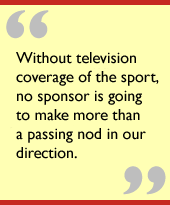
"One welcomes the efforts of Lionel Wharrad, Eric Solomon and others to devise a challenging form of the game that will be suitable for television while not sacrificing the worthwhile features of the standard game. Unlike some other players, I am not at all dismayed at the prospect of seeing the game played on a smaller lawn, over a different course round the hoops, with mandatory peels and so on. But my personal feeling is that the essential minimum requirement for a game to merit the inclusion of the word 'croquet' in its title is that it should incorporate in its rules the potentially break-making sequence of rush; croquet stroke; continuation stroke.
"What so-called golf 'croquet' conspicuously fails to offer is the croquet stroke. So why do we persist in calling it 'croquet'? It is a pleasant enough diversion, as is draughts. But it is not to be compared to the delights and subtlety of (association) croquet and chess and it should not be allowed to retain a similar name.
"My fear is that, because the necessary development work on an acceptable television form of croquet will take a few years, our greed to obtain sponsorship at any price will lead us to consider hoop golf as a suitable vehicle for attracting money for our Association and publicity for our players. Once this is attempted, no matter how vigorous the disclaimers on TV that the game being shown is not 'proper' croquet, those half-baked notions that the public has so readily (and universally) absorbed will be all too obviously confirmed. They will see what is going on as merely a slightly less foolish form of the bashing-into-the-shrubbery routine that they imagine to be at the core of our eccentric indulgence.
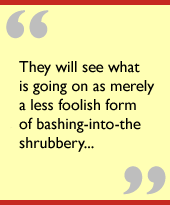
"The harm this would do to the future prospects for the development of our sport would, in my view, be quite irreparable. We might as well get the flamingos back from the taxidermist straight away.
"My motion to force a change of name to hoop golf is a serious attempt to minimise the potential harm that may be done. But my even more passionate hope is that I can persuade fellow members to attend the AGM to forestall our strikers before the monumental fault of encouraging publicity for this quaint activity is countenanced."
The letter was signed, "Roger Wheeler, Nottingham and Hunstanton Clubs, Ex-member of Council."
Roger resigned from council over this issue. Although he writes like one of the old guard, in fact at the time he was really from the new breed, a working player (University lecturer at Loughborough), not from the south, about 50 years old and not upper class.
Spring 1984 included a two-page article titled "Golf Croquet on Television". Here are a few excerpts:
"On 29 October 1983, the Council considered a report by the Sponsorship Committee and decided by 16 votes to 7 to accept the unanimous recommendation of the committee that it should be authorised to proceed with negotiations with a view to securing sponsorship of a televised Golf Croquet tournament. It is understood that a motion will be proposed at the Annual General Meeting on 7 April 1984 to reverse that decision. In view of the nature of the motion and the complexity of the subject-matter to be debated, the Council has authorised the publication of an abridged version of the Sponsorship Committee's report to allow Associates to consider the arguments that were accepted by a majority of the Council.
"In September 1983, the Sponsorship Committee received an approach involving the sponsorship of a televised Golf Croquet tournament.. Although we wish to proceed, we are aware that the Council recently decided that Golf Croquet should not be promoted. Accordingly Council will be asked on 29 October 1983 to modify that decision ..."
The document starts by some preliminary remarks about the need for publicity, sponsorship and TV then goes on to make the familiar analysis of four types of croquet - association, 2-ball, small lawn (the current name for short croquet), and golf croquet. They favoured the latter and proceeded with this analysis: "Accordingly, judging the issue solely on the suitability of each form of croquet as an entertainment TV game, we have no doubt that Golf Croquet is easily the best. We also believe that it is the only form of the game that is likely to be a TV success."
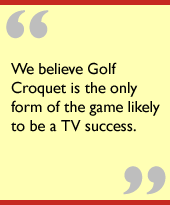
It then considers some counter arguments, along the lines of Roger's letter, summarising:
"To conclude, the fear that the public will be misled by seeing Golf Croquet on television is based on the mistaken assumption that a television audience takes a detailed interest in what they watch. They do not. They have a general view and this can be improved by Golf Croquet in a way that will benefit us and Association Croquet.
"Accordingly, we recommend that the Council authorises us to proceed with negotiations with a view to securing sponsorship of a televised Golf Croquet tournament."
The document was signed with the names of R.A. Godby, S.N. Mulliner, C.B. Sanford, and J.W. Solomon.
I assume that this list of signatories constituted the Sponsorship Committee. At that time committees were 100% members of council. It is amusing to note that two or three of these four (RAG, CBS and maybe JWS) were members of Hurlingham at the time, and that club did not permit golf croquet to be played on its front lawns for at least the next 10 years.
It is immediately followed by an article from Roger Wheeler, titled "Sponsorship", which read in part, "From the Winter Gazette (173), associates will have learnt of the Council's decision of 29 October 1983 to seek sponsorship for golf 'croquet' and some members will by now have deduced that the reason for my resignation from Council is that I intend to oppose this policy with all the vehemence I can command at this year's AGM. [Annual General Meeting] It is a policy that I consider to be totally misguided and contrary to the best interests of our Association and of croquet generally: indeed. I am appalled that the Council can even contemplate such a venture."
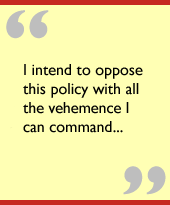
Later in the magazine is a letter from Mulliner refuting some of the points of Wheeler's letter of the previous Gazette (namely, "Council was motivated solely by the lure of money", ".. the .. decision was 'ill-considered'", "...it is only a matter of time before a small-lawn game is available which will be suitable for television").
At the end of the Gazette the agenda for the AGM is printed, the only
substantive item being "Motions
(i) by Dr. R.F. Wheeler:
That Council's decision of 29 October 1983 to seek sponsorship for Golf
Croquet be reversed and that Council be debarred from making any further
attempts to attract sponsorship or publicity for that game without obtaining
the explicit authority of the Croquet Association's members at a General
Meeting.
(ii) By Dr. R.F. Wheeler:
That the official name of GOLF CROQUET be changed to HOOP GOLF and that this
name be used in all documents issued by the Croquet Association and in
any correspondence or negotiations with potential sponsors."
Earlier in this issue were reported extracts from the Proceedings of Council meeting 11 February 1984: "It was decided that members of the Council would have a free vote at the Annual General Meeting on the motion to alter the name of Golf Croquet to Hoop Golf, as the matter has not been debated in Council". Pointedly it does not mention the other motion. Perhaps they were expected to toe the party line.
That AGM remains the only Croquet Association AGM that I have ever attended in my 20-plus years of membership (their content is very dry normally). I cannot remember the events very clearly but I know that I voted in favour of motion (i) and was proud at the time. I seem to remember Keith Wylie (a croquet God to me) speaking in favour of the motion but I may be wrong. I can say that at the time:
* No-one in Britain knew anything about the playing of Golf Croquet in
Egypt.
* Golf Croquet was played by beginners in some clubs.
* It was sometimes played for fun by association players in the evening
after their games for the day were complete at tournaments (the tournaments
were very laid back with rarely more than two games a day).
* At my very large club (Cambridge University) the game was rarely played,
indeed not at all at my (dominant) college.
* One of my friends had reached a handicap of 4 after a couple of years of
play (approaching A class) when he was playing a match for the University at
another club; after his game his opponent asked him if he would like to play
a game of Golf Croquet, and I will always remember his reply of "What's
that?" I myself only knew of the game from reading the law book cover to cover (I am
that sad).
* We were outsiders at the time, with a 40-year age gap between us and other
players at most tournaments, and I think we were sometimes as welcome as a
biker gang might be at a modern tournament. We were certainly brash and I am
sure impolite.
* I doubt that there were any clubs that played only Golf Croquet (there are
anumber now).
The next Gazette, June 1984 reported the AGM:
"Before the motions K.F. Wylie (not on Council) brought up a point of order
referring to a decision made that members of the Council should not speak or
vote against a recommendation which the Council had already approved. It was
agreed by acclamation that they would be able to speak and vote.
(i)
"(ii)
Thus a single vote would have swung it (a tie would have been resolved with
the casting vote in favour of the status quo to defeat the motion). So each
of us who voted in favour were able to leave thinking our vote was the one
to count. Such is the power of democracy, 70 votes deciding something on
behalf of about 1000 members.
I should say something about the Mulliner factor. Steve (as he then called
himself) was a driving force for change within the CA in the 1980s and
1990s, much of it very good and long overdue. This enthusiasm tended to
polarise opinion about him in much the same way that Tony Blair modernising
the UK Labour Party in the 1990s did. It is clear that much of the work
behind this TV proposal came from Steve and so it was his baby. Some votes
against the issue may have been votes against Steve. Indeed I always
remember something known as Prichard's law (from David Prichard of The
History of Croquet, a definitive traditionalist), which was that if you took
the opposite view from that taken by Mulliner on an issue in croquet you
would not go far wrong. (His son Robert Prichard, of a similar view, told me
this many times.)
In the same Gazette is a letter from Jan Macleod (then a very new young
player who was to rise to be one of the top UK women players) on the matter
titled "Handling of televising of golf croquet". She wrote, "I think that
the above happening, first the issue itself, and secondly the manner in
which it was handled, are an unfortunate development for the Association,
which is likely to cause damage or dissention to it, as a consequence of
which both Golf Croquet and, more importantly, Association Croquet might
suffer permanent setback."
She went on to analyse the issue, coming down in favour of Golf Croquet on
TV. She further criticised Roger Wheeler for his actions in taking the
matter to the people after it had been decided on council. "In matters of
this nature it is sometimes more prudent to realise that it is the views of
an elected and informed minority that should be followed, and not that of a wider membership ..." So much for democracy! She also criticised Council in forcing Roger to resign by their
processes (he was not allowed to present the motion while a member
apparently) and the block vote (infamous in Britain with the Unions).
I was not privy to the fall-out of this affair. Croquet muddled on, but I
can only imagine what the potential sponsor and TV company would have thought of
being snubbed. But for a single vote we might have had a different history
of croquet in Britain (and perhaps the world). Of course with what I know
now, I would not support Roger's motion and would probably actively fight
against it. Such are the errors of youth (if 25 counts as youth). It is
amusing that the issue of the name of Golf Croquet is now being discussed
again!
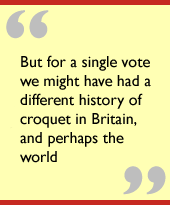
NOTE: Readers are encouraged to register their own recollections and
viewpoints on this issue in Croquet World's Readers' Forum on "Croquet on
TV."